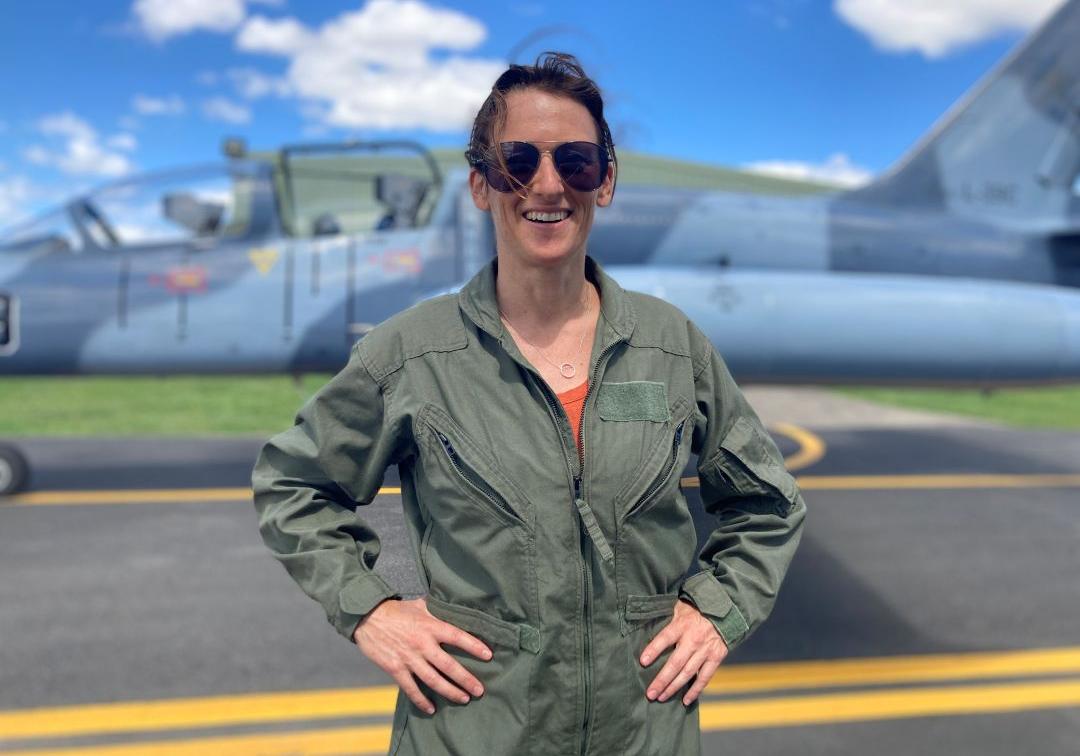Regardless of what astrophysicist Professor Tamara Davis AM FAA discovers about the universe, improving the public’s trust in science will always be more important to her.
This month, the University of Queensland’s School of Mathematics and Physics professor was elected as an Australian Academy of Science fellow and in October will receive the 2025 Moyal Medal, awarded for contributions to mathematics, physics or statistics.
“As a community, we have to make decisions every day about things that affect our lives and scientists want those decisions to be informed by science not superstition or conspiracy theories,” Professor Davis said.
Because astronomy doesn’t evoke resistance in the way vaccines and climate change can, she wants to use it to build bridges.
“Astrophysics is not something that directly affects the average person’s livelihood, so it is a non-confrontational way to build the public’s trust and understanding of scientific evidence,” Professor Davis said.
“Hopefully people will trust science to make sensible decisions when it comes to saving our planet or not letting a pandemic spread.”
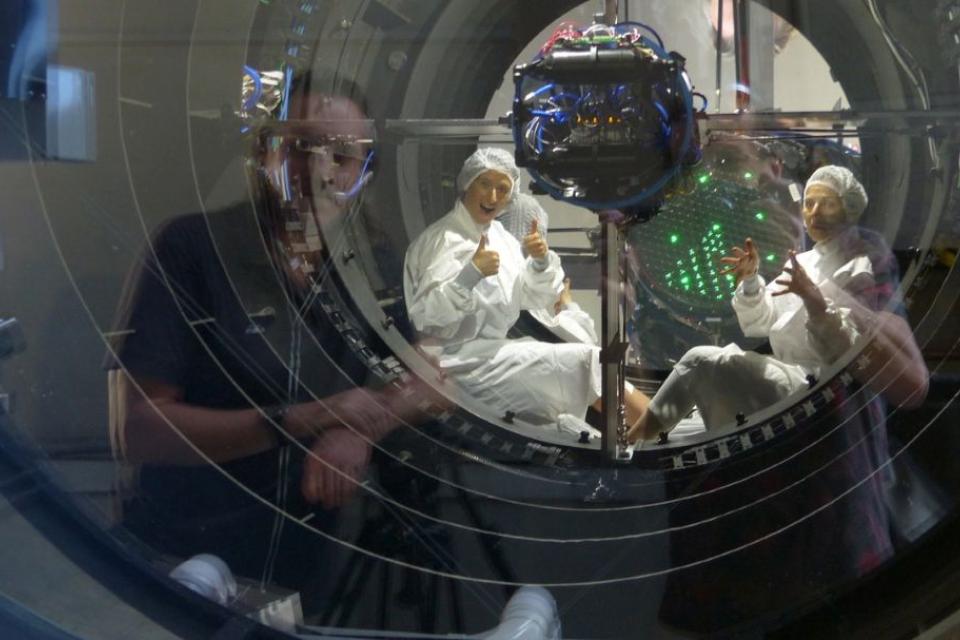
Professor Davis inside the barrel of a telescope.
(Photo credit: Professor Tamara Davis)
Her esteemed career has been dedicated to studying dark energy, the force responsible for accelerating the expansion of the Universe and causing gravity to push rather than pull.
Professor Davis co-led a team responsible for identifying thousands of exploding stars known as supernovae within an international project called the Dark Energy Survey.
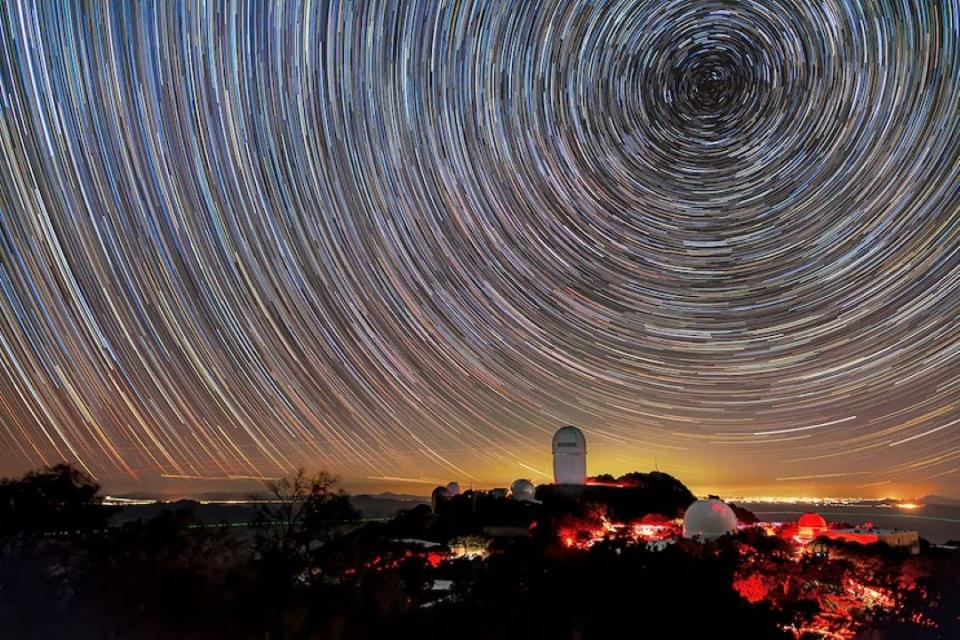
The dark energy spectroscopic instrument is mapping the universe using the Mayall telescope.
(Photo credit: KPNO/NOIRLab/NSF/AURA/B. Tafreshi)
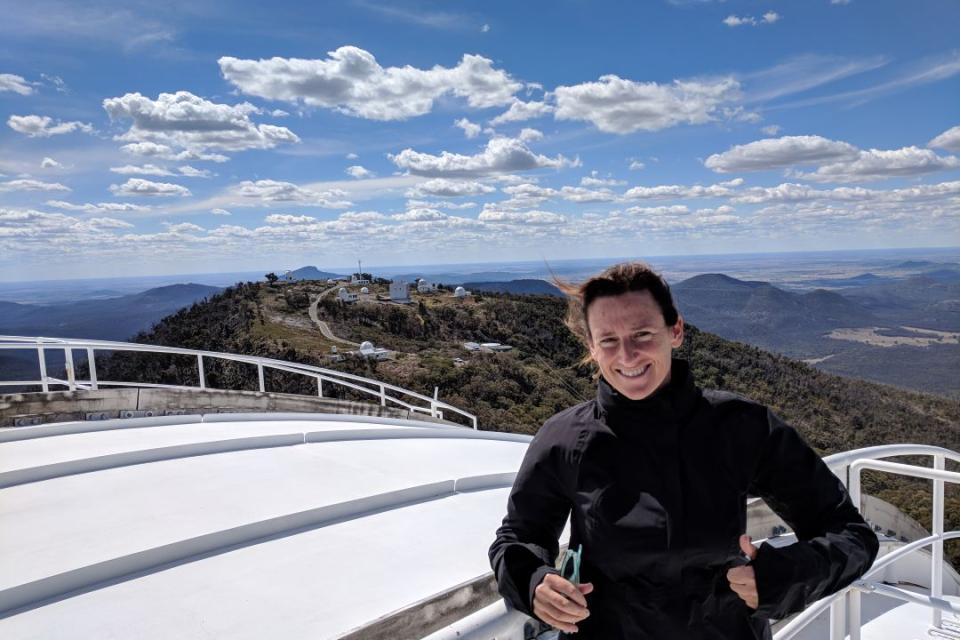
Dr Davis on top of the Anglo Australian Telescope at Siding Spring Observatory where more than 30 telescopes are located.
(Photo credit: Professor Tamara Davis)
Many of these supernovae exploded so long ago the Earth hadn’t even formed yet. They’re so far away that it takes billions of years for the light from the explosion to reach us.
“Our single survey found 5 times the number of distant supernovae ever before seen,” Professor Davis said.
Her team used these explosions as beacons to measure how fast the Universe is expanding. This revealed how the Universe’s expansion has changed over the last 8 billion years.
“In our standard theory of physics, gravity only ever pulls,” Professor Davis said.
“We give the name dark energy to whatever it is that is causing gravity to push.”
Essentially dark energy might only be able to be explained when the 2 separate theories of general relativity and quantum physics are merged.
Speaking my language
Professor Davis is aware the mention of physics can cause the minds of a lay audience to drift off to what seems like outer space.
Although she’s always found a way to bring science into the mainstream, from dressing as Space Girl (pictured) to distilling complex information to a lay audience as a professor.
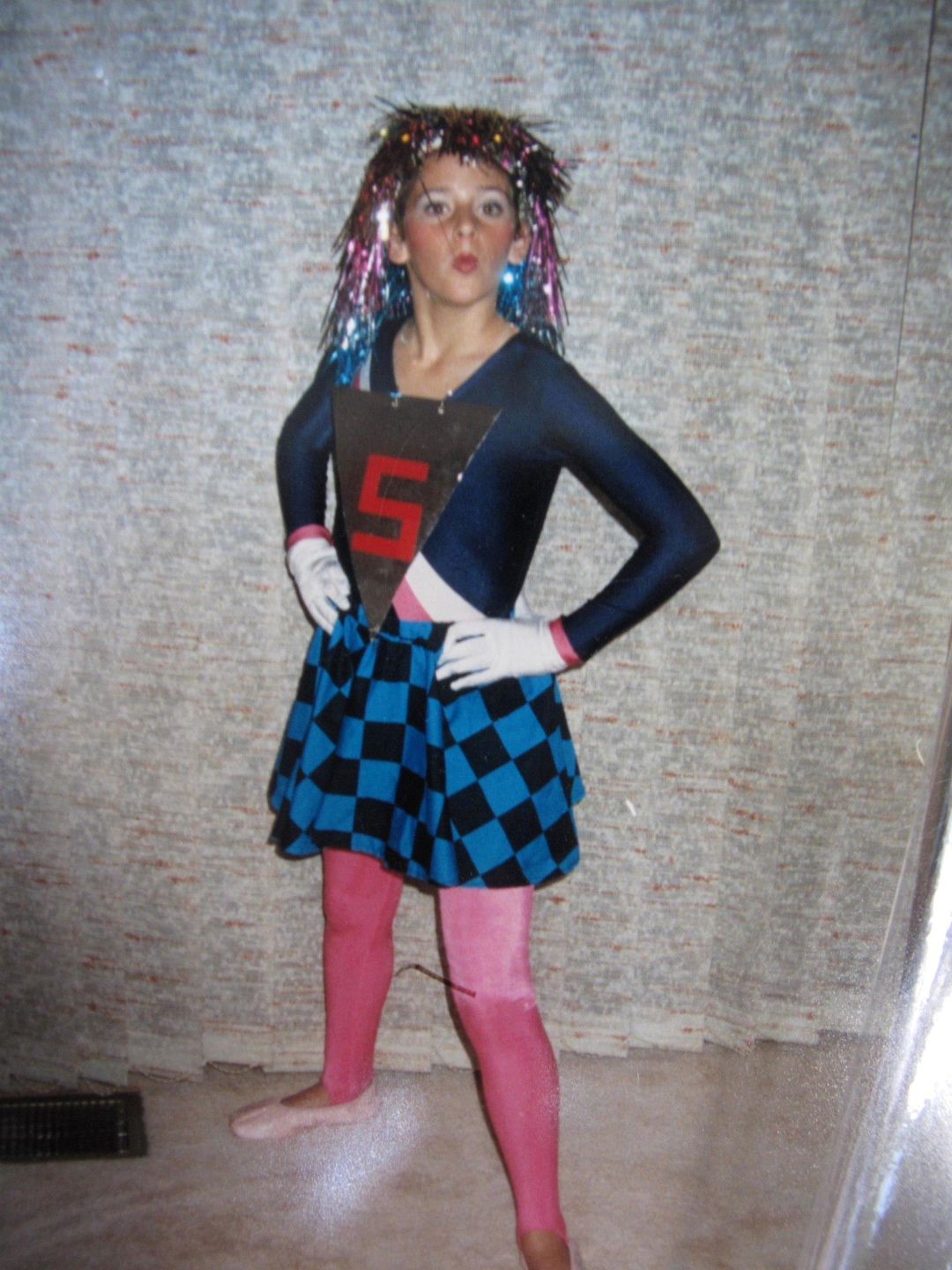
Speaking in accessible language is second nature to her, stemming from a childhood watching science television shows with her father, who ran a successful curtain manufacturing business.
“My dad’s really always been excited by science and when I started studying it, I wanted to share what I was learning with him and the rest of my family,” Professor Davis said.
When Professor Davis was accepting an Astronomical Society of Australia award in front of her family, they realised just how good she was at communicating science to a lay audience.
“My brother’s comment afterwards was, ‘All these years, I thought I understood what you do’,” she said.
“But he said when I spoke about it scientifically, it was a completely different world.”
A visual representation of this school of thinking is Professor Davis’s office bookshelf featuring academic awards and physics literature, with a frisbee and soccer ball filling the bottom shelf.
Professor Davis credits her achievements researching space to her ability to stay grounded and passionate about other interests on Earth.
“When I’m mentoring high school students and they’re saying, ‘Oh, I’m stopping my sport so I can concentrate on my HSE (high school equivalent)’ I’m like, ‘Absolutely not’,” she said.
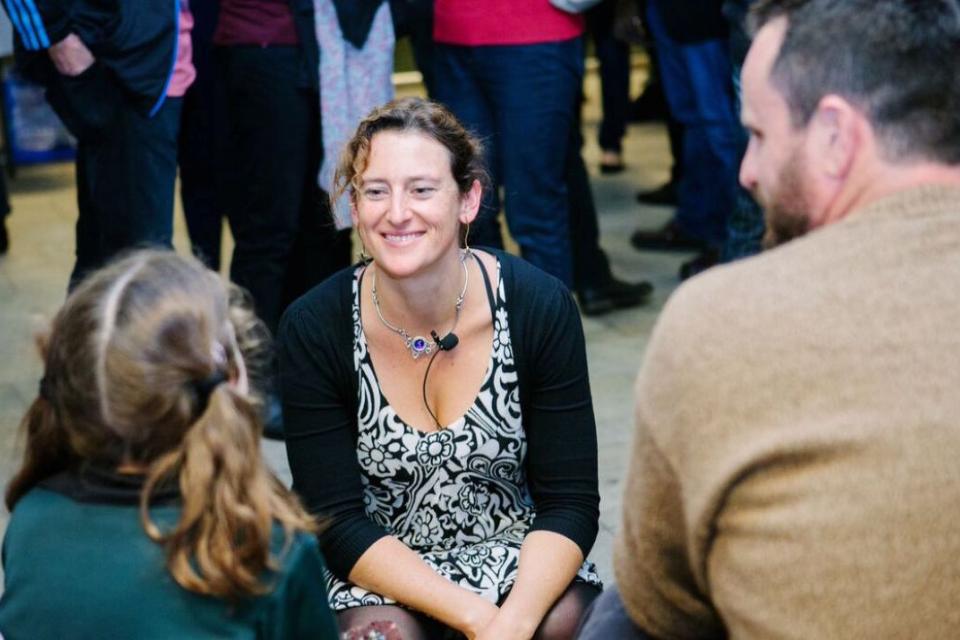
Professor Davis speaking to a young aspiring astrophysicist after a public talk.
(Photo credit: Professor Tamara Davis)
“You can’t work 12 to 14 hours a day and be effective at it.
“You need to go and socialise and do other things and you will be a better scientist if you do those other activities.”
Secret to success
Professor Davis has competed for Australia in various world championships of ultimate frisbee for the past 25 years often as captain, which she continues now in the masters division.
She credits captaining sports teams with improving her leadership and public speaking.
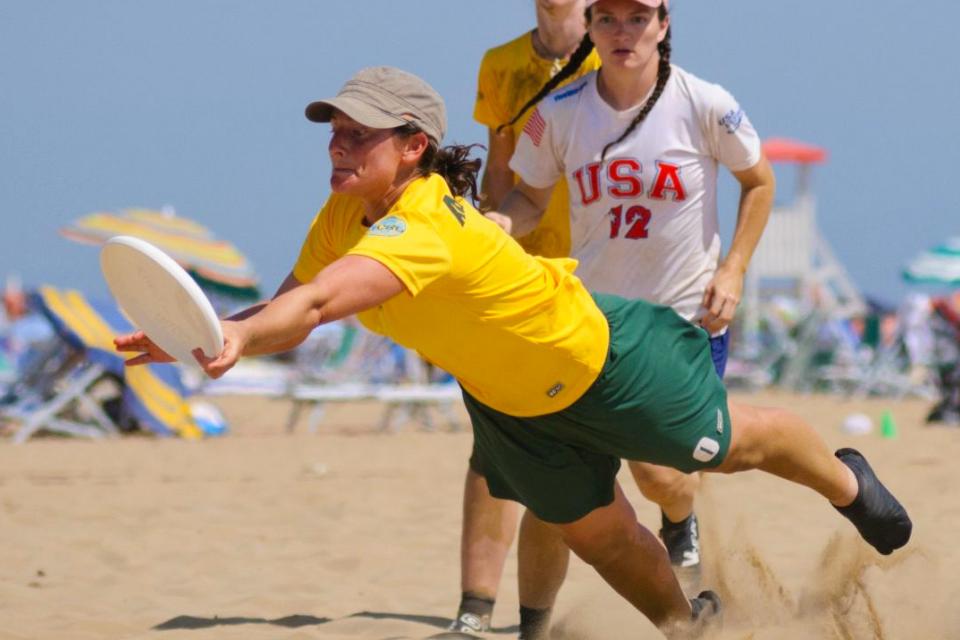
Representing Australia in Ultimate frisbee.
(Photo credit: Professor Tamara Davis)
She’s known for grabbing the frisbee from her office shelf and taking a team of astrophysicists outside at UQ’s St Lucia campus for a team building exercise.
Sport was also Professor Davis’s first experience in a male dominated environment when she became one of the early female members of the Coogee Surf Life Saving Club in the late 1980s.
“There wasn’t even a woman’s toilet in the building, we had to go out the back to the boat shed,” she said.
Despite the stereotypes, Professor Davis said she’s been treated equally to her male colleagues.
“I’ve never felt anything but resounding support and enthusiasm from all of my male and female colleagues,” she said.
“There have been subtle biases, I’ve noticed and laughed at like one of my male students being asked all of the questions in a meeting about a project I was leading.
“My favourite quote was from a senior professor in 2011 at a celebration for a past project where I had been the first female postdoc hired.
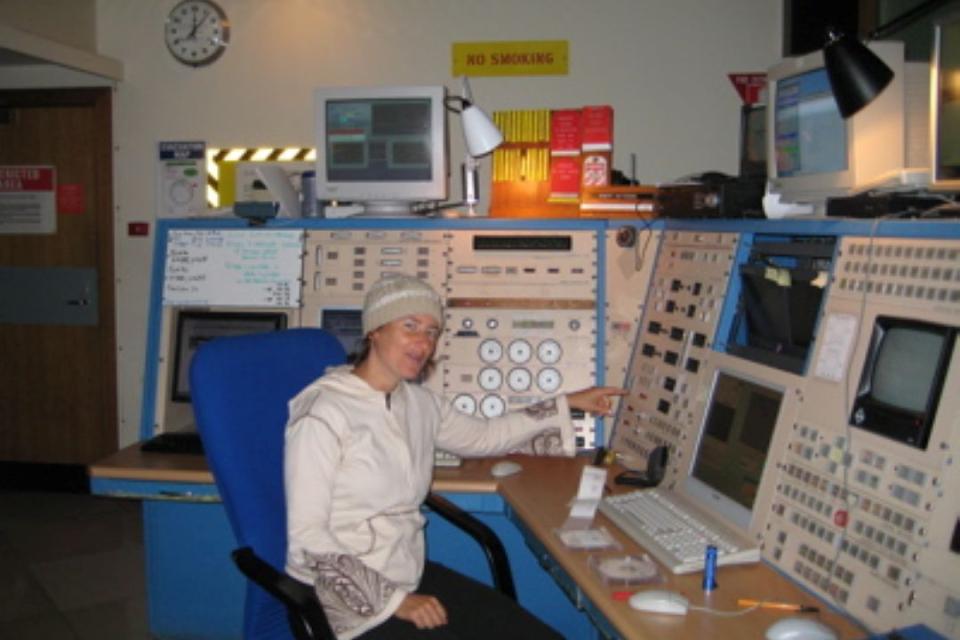
Professor Davis pretending to use the old-school control panel for the Anglo Australian Telescope, which has now been converted to more modern computer control.
(Photo credit: Tamara Davis)
“He said ‘Tamara, it’s been really great having you here. You’ve shown that you actually can hire women without decreasing the quality of work’.”
Professor Davis has won the Astronomical Society of Australia’s Louise Webster Medal for early career research impact, the L’Oréal Women in Science Fellowship for Australia and the Australian Institute of Physics Women in Physics Lectureship.
She’s also been awarded the Australian Academy of Science’s Nancy Millis Medal for outstanding female leadership in science, an Australian Research Council Laureate Fellowship, the Astronomical Society of Australia’s Ellery Lectureship and a Member of the Order of Australia.
“I think some of my skill in this area is my ability to chat to people and understand what motivates them,” Professor Davis said.
“And knowing everyone’s strengths and weaknesses to make sure we are working together as a group.
“When people see that you’re supporting them and you’re not there just to extract effort, then that inspires people to work with you and join your group and do amazing things.”
Professor Davis is Deputy Director of the Australian Research Council Centre of Excellence for Gravitational Wave Discovery.
She continues to lead the Australian component of the international Dark Energy Survey and is working on the Dark Energy Spectroscopic Instrument (DESI) project.
The DESI project is creating a 3D map of tens of millions of galaxies spanning 11 billion years of cosmic history.
The DES and DESI survey results found dark energy’s ability to cause the Universe to expand could vary with time.
The finding has been described as, “The first real clue we have gotten about the nature of dark energy in 25 years” by Nobel Laureate Adam Riess.
The papers are amongst the most highly cited astrophysics research papers of the last 2 years.
While her work understanding dark energy may not immediately impact the general population’s everyday lives, it does improve the science community’s knowledge of the fundamental laws of physics.
And there are flow-on effects.
The specialist camera technology and software developed for the telescopes to study dark energy was already having a tangible impact.
“The medicine industry is using imaging techniques initially developed for astronomy,” Professor Davis said.
“One of my friends worked on an app where you can monitor whether your moles are potentially cancerous by uploading photos over time to see if they grow.
“That’s using the same techniques we use to monitor exploding stars where you take repeated images and notice what’s changed.
“The number of spin-offs from astronomy research is huge, but one of the most important are the young researchers trained to tackle difficult problems, who go on to advance industry, data science, medicine, earth monitoring, and technology.”
Professor Davis plans to display the Moyal Medal next to her esteemed ultimate frisbee accolades and the other academic awards she’s accumulated.
“I really enjoy the process of discovering things and the everyday work of sitting down and running computer code to try and figure something out,” Professor Davis said.
“Also, you get to work with amazing people who are really talented and exciting, who are inspired by their work and it’s just an amazing environment to be able to work in groups like that.”

